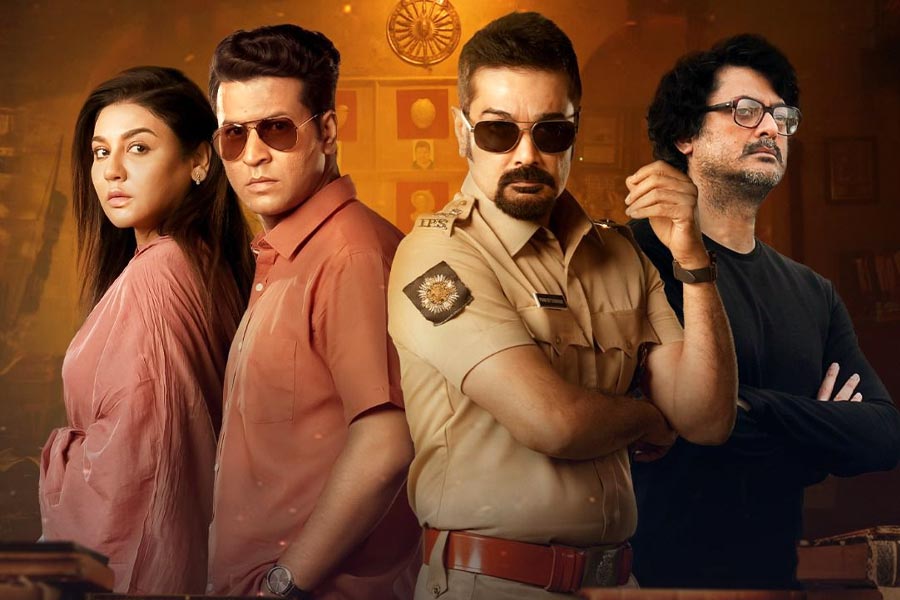‘Babu noy, sir. Aami mudir dokan chalai na (Sir, not babu. I don’t run a grocery store).’
This was the dialogue that had made Probir Roy Chowdhury a memorable cop in Srijit Mukherji’s Baishe Srabon in 2011. Twelve years later, he is back in Srijit’s cop universe film Dawshom Awbotaar — a first-of-its-kind in Bengali cinema — that also marks Jio Studios’ foray into Bengali films as producer, in collaboration with SVF.
Prosenjit Chatterjee reprises his role as the brooding cop who specialises in investigating serial killings in this prequel to Baishe Srabon, set around a decade before the events of the 2011 crime thriller. Probir is joined by inspector Bijoy Poddar, played by Anirban Bhattacharya, from Srijit’s 2019 thriller Vinci Da.
In Baishe Srabon, Probir was an out-of-work cop, suspended over allegations of custodial torture. In Dawshom Awbotaar, he’s much younger and is facing an inquiry for his heavy-handed approach to dealing with criminals. At work, his colleague Amit Srivastav (Rajesh Sharma) keeps reminding Probir to check his urge to beat up goons in police custody (for the uninitiated, Srivastav goes on to become the police commissioner in Baishe Srabon).
Enter serial killer Biswaroop Bardhan (Jisshu Sengupta) who thinks himself to be the tenth avatar of Vishnu. His targets — shady businessmen, promoters, coal mafia, corrupt doctors, teachers accused of sexually harassing their students. His modus operandi involves a complex interpretation of mythological texts about the avatars of Vishnu. For instance, the first victim is killed using a piranha and the second one is smashed to death with a tortoise showpiece. Probir is assigned the case, and he takes on Bijoy as his apprentice. A cat-and-mouse chase begins but Biswaroop is always a step ahead of the cop duo.
When their investigation hits a dead end, Probir and Bijoy receive help from an unexpected source. A psychiatrist, disturbed by media reports on the serial killings, comes forward and claims to know the man behind these murders. Moitreyee Ghatak (Jaya Ahsan) promises to help the cops nab Biswaroop, going to the extent of offering herself as bait to lure him out. In the course of the investigation, Bijoy and Moitreyee fall in love, until a twist of fate puts all of their lives at risk.
While Baishe Srabon was a whodunit, Dawshom Awbotaar reveals the identity of the serial killer in the first frame itself. Knowing the identity of the killer or his motivation behind orchestrating the murders doesn’t take away from the fun of watching Probir and Bijoy rack their brains to zero in on the killer. This is a whydunit with a predictable but heart-wrenching twist in the end.
Srijit manages to infuse Dawshom Awbotaar with the essence of his previous film. For instance, in a particular sequence, we find ourselves back in the precinct office where Probir and Bijoy are engaged in a tense discussion. A constable comes in to inform them that there’s a visitor. This scene, reminiscent of a similar one from Baishe Srabon, is particularly important because in the 2011 thriller, the visitor was hand-in-glove with the killer and had the cops chasing a red herring. Does anything similar happen in Dawshom Awbotaar too? You’ll have to find out.
And like Baishe Srabon, Dawshom Awbotaar too has its share of poetry. While the former featured verses from poems written by activists of the Hungryalist Movement as murder clues, Dawshom Awbotaar has Bengali translation of the works of German poet Rainer Maria Milke as clues to the motivation behind the serial killings. And guess whose translations are referred to in the film? Nibaron Chakraborty, the eccentric poet played by Goutam Ghose in Baishe Srabon.
The chemistry between Probir and Bijoy forms the backbone of Dawshom Awbotaar. Prosenjit and Anirban feed off each other in their interactions, and their bromance as a senior cop and a junior cop is spot on. Their tension-filled dynamic adds as much to the thrill quotient as their chase after the killer.
Jisshu Sengupta stands out as the maniacal killer who comes across as nerdy on the surface but exudes a sense of unnerving unpredictability and menace. Jaya Ahsan shines too. She makes her character enigmatic while sizzling in the romantic track with Anirban Bhattacharya.
The songs composed by Anupam Roy — especially Aami Shei Manushta Aar Nei, also sung by Anupam — and the background score by Indraadip Dasgupta elevate the narrative, evoking nostalgia and providing a soulful backdrop to the story.
Yet, compared to Baishe Srabon, the plot of Dawshom Awbotaar comes across as simplistic. It’s easy for anyone paying close attention to guess what’s about to come. At 154 minutes, it is also overstretched, specially in the second half. The reason why the climax of Baishe Srabon hit us so hard was its suddenness. The massive reveal in Dawshom stretches on for quite some time, losing its intensity.











